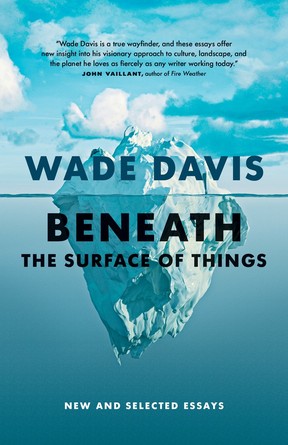Wade Davis's new COVID-19 essay collection digs into America, climate and Jerusalem
Renowned cultural anthropologist/ethnobotanist and UBC professor covers wide range of topics in new collection, Beneath the Surface of Things.

Article content
During the COVID-19 lockdown, Wade Davis turned his time grounded on Bowen Island into an opportunity.
The anthropologist, writer, filmmaker, University of B.C. professor, former Explorer-in-Residence at the National Geographic Society and incessant traveller, decided to address a wide range of issues including war, America, climate, Jerusalem, anthropology and exploration in a 13-piece collection of essays titled Beneath the Surface of Things.
To put Davis’s downtime into perspective, since last September, he has visited 20 countries.
“Being stuck in the lockdown for me, as horrible as it was for so many people, and my heart goes out to those who suffered, but for me it was kind of this amazing life moment,” said Davis, who has written 23 books including the 2012 Samuel Johnson prize-winner, Into the Silence. “I had no choice but to stay put. And I began to look at my previous life of travel as a hallucination and it allowed me to really read and find in books what I sought in the wild corners of the planet.”
The collection itself isn’t related as much by themes as they are by the circumstance of their birth. A kind of anthropology sampler, Davis traverses through a breadth of topics, settling often on our cultural condition.
“The reason the title came about, Beneath the Surface of Things, is that it is an attempt to use the anthropological lens to look beneath the surface of things,” said Davis, who continued his explanation by referencing the essay, Beyond Climate Fear and Trepidation.
“The climate essay is a perfect example. Obviously, in no way am I a climate denier. I’m simply asking why aren’t we being more effective in making that transition?” said Davis. “When I say looking beneath the surface of things it’s looking beneath. For example, the climate consensus, which is hardened so firmly that anyone who questions any element of it is subject to censorship. And maybe because of that we are not seeing through to what we really need to do to actually effect the change the climate demands.”

Davis, who said he is about to retire after 10 years of teaching in UBC’s anthropology faculty, also questions what is happening on university campuses. He suggests “the political orientation of university professors is skewed dramatically to the left,” and that, he says, silences the much smaller conservative faculty voices.
“People feel obliged to align themselves ideologically and I find ideology to be anathema. I find it to be the enemy of curiosity. The enemy of intellectual integrity and openness,” said Davis. “One of the reasons I enjoy teaching freshman is they have not spent three years being ideologically indoctrinated by the university system. I really do believe it has gotten that bad.”
The essay collection is made up of four new pieces, nine written and published during the lockdown years. Of those previously published, the most notable — in terms of reach — was The Unravelling of America. In his introduction to Beneath the Surface of Things, Davis explains how that essay came about and points out that, within the first six week of it being published by Rolling Stone (Aug. 6, 2020), it attracted five million readers and collected 362 million social-media impressions.
Looking back, Davis says The Unravelling of America got some things right and some things wrong. And while readers may have seen it as an indictment of the U.S., he saw it as an “intervention,” of sorts. But now, four years later, the parts he got right still ring true as Donald Trump and the U.S. presidential election loom like a scythe over the psyche of the world.
“I think it hit a nerve because of the intensity of that moment. And it offered an explanation, not a completely accurate one in retrospect I suppose, but certainly an explanation that resonated at that moment,” said Davis. “At that moment, the United States was in a particularly dismal moment. With the re-election of Trump being a distinct possibility. With the rates of mortality and morbidity per capita higher than almost any other country, and what appeared to be an almost sort of failure of the basic infrastructure.”
Of course, the cult of Trump is the question many want answers for. And Davis understands that.
“One of the things I mention in that essay is Trump wasn’t the cause of America’s decline, he was a symptom of it. I think that remains true to this day,” said Davis. “If you look at the fact there is a very high chance in America, despite all that’s unfolded since that essay was written, including the events of Jan. 6 and so on, that all this has happened, and all the indictments (that) have come down the country may well be about to re-elect this grifter.”
That leads to the elephant in the room that is the future of America.
“The question becomes what will become of America’s second century? I can’t help but think that the signs are still there — that you are looking at a culture or civilization, if you will, in kind of decline,” said Davis.
As for our own country and the voices of the anti-tax and anti-vax movement becoming louder, Davis isn’t convinced that a MAGA-like situation is in our future.
“In Canada, polls suggest that less than 14 per cent of Canadians would vote for Trump. And the fact that he is ahead in the polls in the States speaks to the fundamental difference in values between the two countries,” said Davis.
But he does see a polarization problem as both ends of the political spectrum dig their heels in.
“Canada has become the most, in a sense, ‘woke’ country in the world. And one thing we’ve learned about that ‘woke ideology’ is that it tends to provoke a legitimate reaction in some situations from those who feel it has gone too far. And so part of the populism that you see in Canada, I suspect, is not unlike some of the reaction one has to the ‘woke ideology’ in the States,” said Davis.
“I think that some of that populist reaction is not necessarily something readily to be dismissed as just some kind of reactionary response to what people presume to be progress. Because, in many ways, the progressive left is neither left nor progressive.”
For Davis, the problem is that “the ideology of the left doesn’t speak about class anymore. It doesn’t really speak about economics. It speaks about identity,” and that “righteousness,” he says, quickly limits much needed conversation.
“Anything that challenges the freedom of expression, freedom of diverse thought … is a threat to the core of who we are as a people,” said Davis. “One treads so gently on this ground because, even to challenge any element of the so-called progressive left agenda, is to become targeted for retribution. So, one dances around a topic very carefully. And that, in of itself, is a disconcerting sign.”
Bookmark our website and support our journalism: Don’t miss the news you need to know — add VancouverSun.com and TheProvince.com to your bookmarks and sign up for our newsletters here.
You can also support our journalism by becoming a digital subscriber: For just $14 a month, you can get unlimited access to The Vancouver Sun, The Province, National Post and 13 other Canadian news sites. Support us by subscribing today: The Vancouver Sun | The Province.













Postmedia is committed to maintaining a lively but civil forum for discussion. Please keep comments relevant and respectful. Comments may take up to an hour to appear on the site. You will receive an email if there is a reply to your comment, an update to a thread you follow or if a user you follow comments. Visit our Community Guidelines for more information.